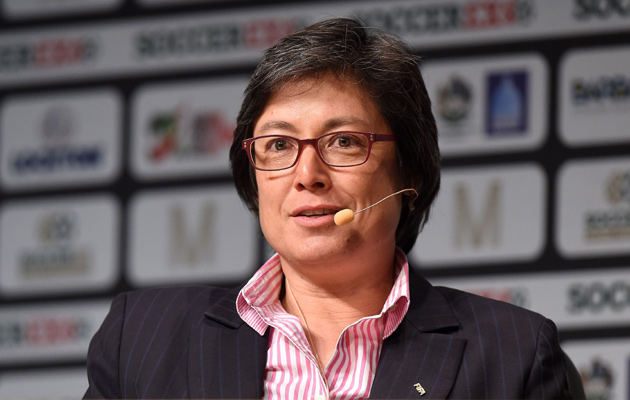All six confederations should send at least one woman to FIFA’s executive committee, according to proposals submitted to its reform committee.
After presidents Sepp Blatter (FIFA) and Michel Platini (UEFA) – both men – have used the media lately to bellow angry resentment at their ethics suspensions, the need to address the sport’s gender imbalance may be viewed as a positive and long-overdue step.
The reform panel, headed by veteran Swiss sport lawyer Francois Carrard, started work only in September and must set before the exco, in early December, a package to be recommended for approval next February by the congress which will also vote in a new president.
Reform, according to a submission entitled FIFA, football and women: why reform must specify inclusion and investment, should address urgently what it describes as “perhaps the most profound, long-standing and systemic injustice in sport – the exclusion of women and girls from the world’s most popular game.”
The author of the report is Australian Moya Dodd, a co-opted member of the FIFA exco and chair of the task force for women’s football. It is being introduced to the reform committee by New Zealander Sarai Bareman, one of two delegates from the Oceania confederation.
Dodd, a former Australian international, has spoken up loudly against gender imbalance in football against a background in which women’s football and its major competitions have exploded in popularity across the world.
One of the most contentious issues among reformists is what to do with the exco whose credibility has been ripped apart by the misbehaviour which has seen a steady stream of members banned from the game or fleeing of their own accord.
Only in 2013 was a first woman formally voted onto the exco in Burundi’s Lydia Nsekera when Dodd and Sonia Bien-Aime from Turks & Caicos were co-opted. Bien-Aime is now a formal CONCACAF delegate, a development which Dodd and Bareman want to see extended by regulation to every confederation.
The eight-page submission homes in initially on the pressing need for demonstrable FIFA reform and proposes that this should include addressing gender imbalance.
It notes: “Women comprise only eight per cent of exco members globally. At confederation level, only eight women hold exco positions, and some confederations have none.
“Within FIFA itself, there are three women out of 26 exco members; the standing committees contain hardly any women (outside the women’s football committees); and only one director is female.
“Globally, just two of 209 member association presidents are women – less than one per cent of the voting population in FIFA Congress – and in the majority of confederations there are none at all.
“The fact is that 111 years after FIFA was formed, women are still vastly under-represented at every level of the pyramid in the world’s most-loved game. These patterns are sadly resistant to progress. Indeed, the FAs in the most established confederations, UEFA and CONMEBOL, have the least women on their boards.”
This imbalance contributed directly to an under-funding of the women’s game.
Hence the need for a reform recommendation for “an immediate 20pc presence of women on the FIFA executive committee, to be mirrored within a reasonable time at all levels (confederations, member associations, clubs, etc) with a longer-term target of 30pc gender balance.”
In case male members of the exco are frightened for their perks, the proposal is that each confederation adds one woman to its representation on the exco.
This would take the exco composition to 30 which may raise concerns in itself at a time when the numerical balance between the confederations is already under pressure from proposals for the addition of independent directors and representatives of referees, leagues, clubs and players.
Any federations which dragged their feet could find obstructive tactics costly. One proposed consequence of non-compliance is “the loss of eligibility to receive FIFA grants or participate in development programmes.”
On the other hand, as Blatter once said: “The future of football is feminine.”







